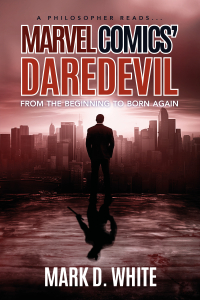 Ockham, 2024 | Order from Amazon, Barnes & Noble, or Bookshop.org
Ockham, 2024 | Order from Amazon, Barnes & Noble, or Bookshop.org
From the back cover:
Matthew Murdock is a man of contrasts. He was raised in poverty and grew up to become a lawyer, thanks to his single father, a boxer and part-time mob enforcer who pushed his son to study rather than fight. Blinded by a freak accident that also heightened his other senses, Matt acquired a range and depth of perception that sighted people can only dream of. Together with fighting skills acquired in violation of his father’s wishes, he uses his enhanced senses to fight crime as the costumed hero Daredevil, the Man without Fear, who regularly violates laws he has sworn to uphold as a member of the bar.
In this book, philosopher Mark D. White explores the moral character and behavior of Daredevil, one of the most intriguing and dramatic characters in superhero comics. Focusing on his earliest stories, from 1964’s Daredevil #1 to 1986’s “Born Again” storyline, we’ll ask who Matt Murdock is and why he does the things he does, in terms of both motivation and the basic character traits that influence his choices. We’ll examine Matt’s belief in the importance of rules, the role of promises in his life, and his sense of responsibility, each of which he tends to take farther than he should. We’ll discuss how he balances his personal devotion to the law with his nocturnal activities, and we’ll follow him as he becomes more violent, crossing the line into torture, but avoiding killing (for the most part). Most generally, we’ll watch as he gradually starts to come apart at the seams, the roots of which appear early on but intensify as the years go on, reaching a climax as his life is completely dismantled in “Born Again” with the help of one of his greatest foes—and one of his closest friends.
Written to appeal to newcomers to both comics and philosophy, A Philosopher Reads Marvel Comics’ Daredevil is the perfect introduction to how Matt Murdock developed over his first several decades to become a superstar of comics, TV, and movies today. His story can also provide a way for us to think about how we deal with our own internal conflicts and contrasts—without ever having to put on a skintight red costume!
– — — —- —– —- — — –
You can read the introduction to the book here.
I published a few posts at Psychology Today adapted from the book (mainly from the last two chapters focusing on his mental state, not the earlier ethics material):
- How Much Should You Question the Value of What You Do?
- Why You Should Be Careful How Much Responsibility You Take
- Matt Murdock’s Identity Crisis: To Be or Not To Be Daredevil
- Even a Superhero Can Cycle Between Delirium and Despair
More recently, I posted there on ethical topics from my book based on the Disney+ series Daredevil: Born Again:
- Balancing Grace and Retribution in “Daredevil: Born Again”
- Daredevil, Born Again: Making the Case for Virtue Ethics
(Also check out my older Psychology Today posts about Daredevil: Marvel Comics Explores Postpartum Depression in “Daredevil”; Marvel Comics’ Daredevil Shows the Experience of Depression; and Even Superheroes Suffer from Self-Loathing.)
My friends at the Seize the Moment Podcast were kind enough to speak with me about Daredevil and my book, contributing their own insights:
I also spoke to the Good Is In the Details podcast, which took a turn about halfway through to focus on work-life balance and relationships!
– — — —- —– —- — — –
TABLE OF CONTENTS
